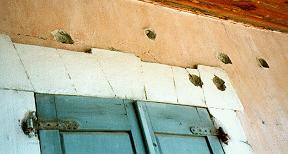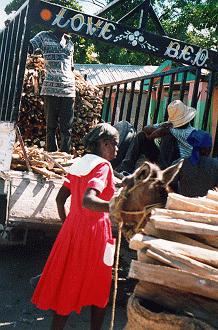|
|
|
Give me the souls
|
|
|
|
Give me the souls
|
The table and the assault rifle |
| by Peter Costantini | Port-au-Prince | December 21, 1995 |
|
beginning
Low turnout Only the outlaws have guns |

|
Bottom-up development
end |

![[top]](./art/top1.gif)
![[up]](./art/up1.gif)
![[bottom]](./art/bottom1.gif)
![[down]](./art/down1.gif)
"People are under the table! People are on top of the table! This has got to end!" said President Jean-Bertrand Aristide ![[speaker icon]](art/speaker3.gif) of Haiti on December 15.
of Haiti on December 15.
"Bò tab la"
At a supermarket in Pétion-Ville
In Washington, the Republicans are using the vote's shortcomings
to flagellate President Clinton. For the Democrats, the clear
outcome certifies a foreign policy victory. The bottom line for
both is to reduce the boiling pot of Haitian misery to a simmer
and keep the boat people at home.
In Haiti, the meaning of the elections is messier. The voting
was clean in most places and electoral officials made valiant
efforts under impossible conditions: many had to count the ballots
by candlelight and walk miles to deliver the results. "The
organization is still loose here, a little chaotic," a Latin
American who has observed the four rounds of elections since June
told me. "But each time it gets a little better. Maybe they're
learning."
![[speaker icon]](art/speaker3.gif) (Around the table), is the slogan of Aristide's Lavalas Political Organization, whose candidate, René Préval
(Around the table), is the slogan of Aristide's Lavalas Political Organization, whose candidate, René Préval ![[speaker icon]](art/speaker3.gif) , was elected president December 17 with a landslide of around 80 percent.
, was elected president December 17 with a landslide of around 80 percent.
![[speaker icon]](art/speaker3.gif) , a wealthy suburb of Port-au-Prince
, a wealthy suburb of Port-au-Prince ![[speaker icon]](art/speaker3.gif) ,
two security guards in mirrored sunglasses are packing a semi-automatic
rifle and a shotgun. People are angry. People are scared. A few
people are fingering the trigger and millions are staring down
the barrel.
,
two security guards in mirrored sunglasses are packing a semi-automatic
rifle and a shotgun. People are angry. People are scared. A few
people are fingering the trigger and millions are staring down
the barrel.
![[top]](./art/top1.gif)
![[up]](./art/up1.gif)
![[bottom]](./art/bottom1.gif)
![[down]](./art/down1.gif)
![[poster for René Préval]](photos/tirene1.jpg)
|
Some 70 to 75 percent of the electorate, however, stayed away
from the polls, in contrast to a high turnout for Aristide in
1990. Economist George Werleigh ![[speaker icon]](art/speaker3.gif) , adviser to the previous prime
minister and husband of the present one, and U.S. Ambassador William
Swing, in a separate interview, offered similar explanations.
, adviser to the previous prime
minister and husband of the present one, and U.S. Ambassador William
Swing, in a separate interview, offered similar explanations.
After the President personally endorsed René Préval a few days before the vote, many saw Préval's victory as a foregone conclusion. Many others believe that Aristide, who was exiled for three years by a military coup, should serve out those years now.
Both Werleigh and Swing observed that Haitians are becoming disillusioned. They voted in 1990, but their choice was erased by the coup. They've voted three times previously this year, but daily life for most Haitians remains intolerable.
For the Préval administration, one mantra will be "Se
ekonomi an, estipid" ![[speaker icon]](art/speaker3.gif) (It's the economy, stupid).
(It's the economy, stupid).
Nearly forty years of military kleptocracies have reduced Haiti to penury. Unemployment is estimated at roughly 70 percent. Many families must carry water long distances from polluted sources, and pigs root in mounds of garbage in the streets of Port-au-Prince. Electricity is a luxury that a lucky few enjoy a few hours a day. Telephones are rare and the system is gangrenous.
Even the weather has gotten worse. "Twenty-five years ago, the climate was cooler, there was fog in the mornings on the hills," observed a small businessman recently returned from exile in Montréal. "All the trees have been cut down now, so it's quite a bit hotter here." Poverty drives people to cut down the trees for charcoal, the traditional cooking fuel.
![[top]](./art/top1.gif)
![[up]](./art/up1.gif)
![[bottom]](./art/bottom1.gif)
![[down]](./art/down1.gif)

|
| high-caliber bullet holes in the wall of a rural priest's house |
The other major quandary Préval will face is how to protect
the citizenry when only the outlaws have guns. Aristide, in the
face of opposition from Washington, rightly did away with the
Mafia-like Forces Armées d'Haïti ![[speaker icon]](art/speaker3.gif) . But the still-green
police force carries only revolvers, while many believe that the
hit men have heavy weapons cached away. The United Nations force
that has kept the peace is scheduled to leave February 7.
. But the still-green
police force carries only revolvers, while many believe that the
hit men have heavy weapons cached away. The United Nations force
that has kept the peace is scheduled to leave February 7.
"Don't forget that the death squads are still here,"
said Father René Soler ![[speaker icon]](art/speaker3.gif) , a French priest. "They've
begun to kill well-known people again. The seven thousand soldiers
of the Army are still here too. They've lost their jobs and they're
angry." The leaders of the 1991 coup that killed at least
4,000 Haitians are only a short plane ride away.
, a French priest. "They've
begun to kill well-known people again. The seven thousand soldiers
of the Army are still here too. They've lost their jobs and they're
angry." The leaders of the 1991 coup that killed at least
4,000 Haitians are only a short plane ride away.
Although most Haitians are grateful to the United States for the military restoration of Aristide, most of Haiti's problems can be resolved only by Haitians, and the best thing the U.S. government can do is to stop playing the rescuer. The U.S. role in arming and training the military and death squads over fifty years, though, leaves a moral obligation to make sure they don't come back. If Haiti requests, the U.N. mandate should be extended beyond February and expanded to include more vigorous efforts to disarm the thugs.
No step-by-step instructions exist for stitching together a dismembered
economy while raising the standard of living of the impoverished
80 percent. As Aristide's pre-coup prime minister, Préval
made a good start at clearing the zombi cheques ![[speaker icon]](art/speaker3.gif) (ghost
employees) out of the government ministries and beginning a land
reform for small farmers. But his job will require listening to
his own people, and not all Haitians agree with the neo-liberal
orthodoxy enforced by U.S. Agency for International Development,
the International Monetary Fund and the World Bank.
(ghost
employees) out of the government ministries and beginning a land
reform for small farmers. But his job will require listening to
his own people, and not all Haitians agree with the neo-liberal
orthodoxy enforced by U.S. Agency for International Development,
the International Monetary Fund and the World Bank.
![[top]](./art/top1.gif)
![[up]](./art/up1.gif)
![[bottom]](./art/bottom1.gif)
![[down]](./art/down1.gif)

|
| firewood vendors |
Harry Nicolas ![[speaker icon]](art/speaker3.gif) , a Haitian who works with peasant organizations,
favors bottom-up development: "People have never used electricity
for refrigeration. Electrification is not our first priority today:
first we need to take care of land issues and irrigation and roads.
We need to pick up all the trash out there and use it to make
biogas for cooking."
, a Haitian who works with peasant organizations,
favors bottom-up development: "People have never used electricity
for refrigeration. Electrification is not our first priority today:
first we need to take care of land issues and irrigation and roads.
We need to pick up all the trash out there and use it to make
biogas for cooking."
Many small rice farmers are losing ground to American rice. Most of this is imported by U.S.-owned firms which, like agribusinesses in most developed countries, benefit from direct and indirect government subsidies. Should Haiti use subsidies or tariffs to keep farmers on the land and out of the slums of Port-au-Prince, will Washington cry protectionism?
In trying to foster the long-term sustainability of the Haitian economy and protect his people, Préval risks the ire of global financial markets. States as poor as Haiti are barely sovereign when it comes to macroeconomic decisions. The rules are made in New York and Frankfurt and Tokyo, and they say that Haiti's role is to export agricultural products that it can grow cheaper than anyone else, and provide cheap labor for offshore assembly industries. If it's lucky, it may be able to process the foods it grows.
If Haiti tries to stimulate domestic consumption, invest in human capital or shelter critical industries--that is, if it does what developed countries did to become developed--it will be branded a pariah and cast creditless into the outer darkness.
The future of democracy here, however, is tightly intertwined
with improvements in the standard of living of the poor majority.
If Haiti cannot raise it, or is prevented from doing so by Washington,
disillusionment could flare into fury. Those on top of the table
will raise their assault rifles, and those under it will reach
for their rocks and machetes. And from the rotting bidonvilles ![[speaker icon]](art/speaker3.gif) and the barren countryside, the tempest-tossed will once again
set sail across the Windward Passage for Florida.
and the barren countryside, the tempest-tossed will once again
set sail across the Windward Passage for Florida.

![[top]](./art/top1.gif)
![[up]](./art/up1.gif)
Peter Costantini is Seattle correspondent for Inter Press Service, a news wire based in Amsterdam. He has previously covered elections in Mexico and Nicaragua.
A version of this piece was published on the op-ed page of the Seattle Post-Intelligencer, December 28, 1995.
|
|
|
Give me the souls
|